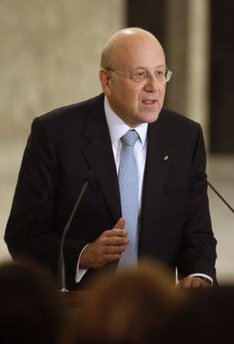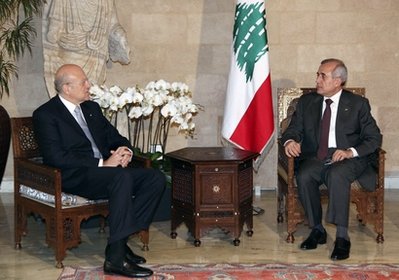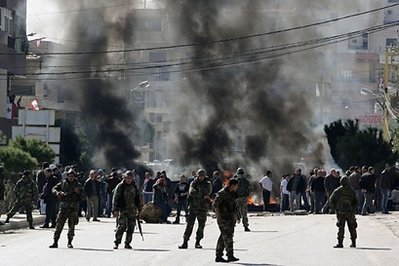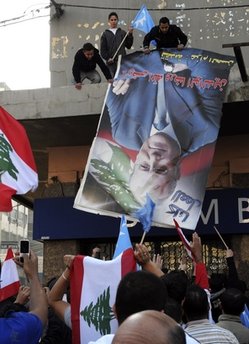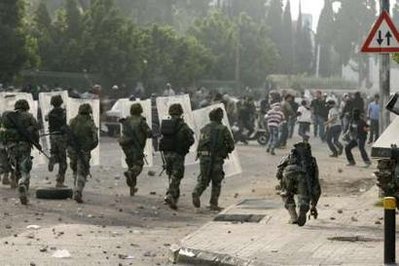t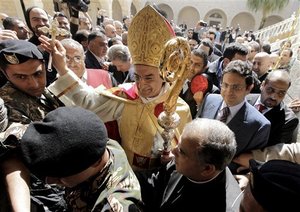
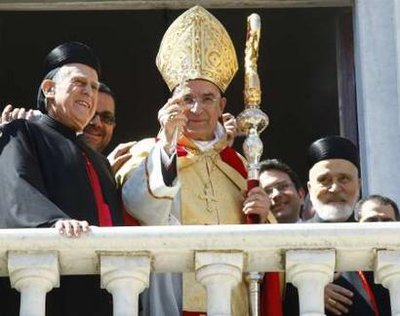
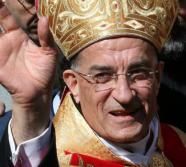
khazen.org, "Our joy has no limit!." Glory to our New Patriarch!!! The Glory of Lebanon is given to you - All of the khazen will serve as your servants Patriarch Mar Bechara Al Raai. The khazen family pray for the new Patriarch to continue, in strengthening and lead he Maronite Catholic Nation all around the World. It is a day of extreme hope, unity and happiness for Khazen.org! Rai, 71, who was the Archbishop of Jbeil, is the 77th patriarch of the Maronite Church, a position. Rai was elected after almost a week of deliberations by 38 bishops at the Maronite Patriarchate in Bkirki. His election was celebrated by a televised mass while Maronite churches across the country rang bells at midday in celebration. “The elections took place with love and peace,” Rai said in a televised speech.
Monsignor Youssef Tawk, head of the Council of Maronite bishops, announced the news from the church's headquarters in Bkerke, northeast of Beirut, after days of meetings behind closed doors during which the Bishops voted on who would succeed the long-serving Sfeir.
Well-wishers, including politicians and clergymen, immediately began to pour in to Bkerke upon hearing the news, some shedding tears of joy.
Cardinal Patriarch Boutros Nasrallah is very happy of the election of the Patriarch and has said of Raii "He is one of the pillars of the church (in Lebanon) and is open to all the communities, he added. "He is a very qualified person from a spiritual standpoint, he listens to everyone and greets everyone the same, whatever their background."
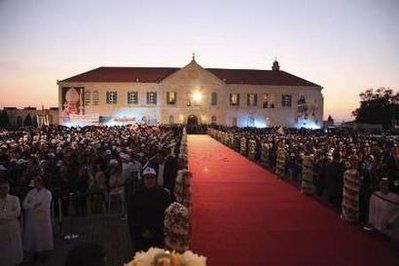
Worshippers attend a ceremony for the newly elected Christian Maronite Patriarch Beshara al-Rai at the the patriarchate church in Bkerki, north of Beirut, March 25, 2011. Lebanon's Maronite Church Christian community held an official ceremony to assume the new Maronite Patriarch Beshara Al-Rai in his new post on Friday held at the Maronite Patriarchate in Bkerki . REUTERS/ Dalati Nohra/Handout
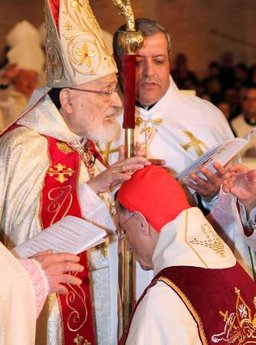
Lebanon's Christian Maronite Cardinal Nasrallah Sfeir (L) blesses the newly elected Christian Maronite Patriarch Beshara Al-Rai during a ceremony at the patriarchate church in Bkerki, north of Beirut, March 25, 2011. Lebanon's Maronite Church Christian community held an official ceremony to assume the new Maronite Patriarch Beshara Al-Rai in his new post on Friday. REUTERS/ Dalati Nohra/Handout
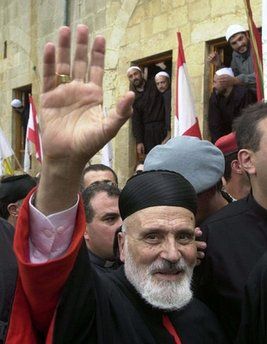
"The El Khazen family represented by two members (Ghosta Branch and Ajaltoun Branch) will have the honor to guard Bkerke during the next election of the Maronite Patriarch. This is a special power and preeminence that Bkerke has over the El Khazen family, as a consequence of its sovereignty and safety of election. The main duty is to ensure that there will be no interference or influence from any outsiders. Cheikh Farid Haikal El Khazen will represent the Ghosta branch and Cheikh Amine Keserouan El Khazen will represent the Ajaltoun Branch.
His beatitude Patriach Sfeir has accomplished tremendously for Lebanese, ensured freedom, Maronite safety and growth throughout the last three decades. The El khazen as a whole are very thankful about the great and unique accomplishments of His Beatitude Patriarch Sfeir and they will remain always servants of the Patrarch at his service."
Daily Star:
BEIRUT: Newly elected Maronite Patriarch Beshara Rai was born in the Metn town of Hemlaya on Feb. 25, 1940. Before his election Tuesday, Rai was head of the Maronite Diocese of the coastal town of Jbeil, northern Beirut, from 1990. Rai received his intermediate and high school education at the College Notre-Dame de Jamhour. In 1962, he received a bachelor’s degree in philosophy and theology and in 1975 he received a PhD in canon and civil law. Rai also studied three years of law at the Pontifical Lateran University in Rome.
In 1995, Rai was appointed by Pope John Paul II as a member in the Pontifical Council for the Pastoral Care of Migrants and Itinerants and he has served on the council since then.
In 2005, he was appointed by the Council of the Catholic Patriarchs of the Orient as a coordinator for the Episcopal Commission for the Family in the Middle East in 2005.
More recently in 2010, Rai was appointed by Pope Benedict XVI as a member of the Pontifical Council for Social Communications.
The new patriarch has also worked in academia. He has been a lecturer in pontifical theology and the sacrament of matrimony at Universite Saint-Esprit De Kaslik since 2001. He has also been a lecturer in legal rights at Sagesse University in Beirut since 2001.
In 1994, Rai received the Order of Merit, Commander Rank, by the Italian president of the Italian Republic and in 2007 he received the National Order of the Cedar. – The Daily Star
The first electoral rounds will begin Friday morning or afternoon after a secretary general – to preside over electoral rounds – and a committee to sort out votes is elected Thursday by the Synod of Bishops following hours of prayers. Former Kesrouan MP Farid Haykal El Khazen and former ambassador Amin El Khazen locked the patriarchate’s doors to visitors. By tradition, members of the Khazen family stand guard in Bkirki until a patriarch is elected. The tradition began in 1703 when a member of the Khazen family used to guard the monastery, which was then under construction, before it became the seat of the patriarchate in 1823. Thirty-seven Maronite bishops, among them several presiding over dioceses across the world, arrived in Bkirki by Wednesday afternoon after flying to Lebanon.
 khazen.org The El Khazen family also would like to send its eloge, gratitude to His Excellency Mgr. Roland ABOU JAOUDE General Patriarchal Vicar Auxiliary Maronite Patriarcal Protosyncelle. Who has played a unifying role for all of the Maronites Nation, in bringing all leaders together and has offered tremendeously to the Maronite Church and to the Lebanese overall. It is through his leadership, unique actions and faith that we are stronger today.
khazen.org The El Khazen family also would like to send its eloge, gratitude to His Excellency Mgr. Roland ABOU JAOUDE General Patriarchal Vicar Auxiliary Maronite Patriarcal Protosyncelle. Who has played a unifying role for all of the Maronites Nation, in bringing all leaders together and has offered tremendeously to the Maronite Church and to the Lebanese overall. It is through his leadership, unique actions and faith that we are stronger today.
Catholic news agency: "Pope Benedict XVI has formally accepted the resignation of Maronite Catholic Patriarch Nasrallah Pierre Sfeir, who is retiring at the age of 91.Cardinal Sfeir has led the Maronite Church since 1986. A new Patriarch of Antioch will be elected at a meeting of the Maronite Synod of Bishops, expected to be held at Bkirke, the headquarters of the patriarchate, in March.
At his request, Patriarch Rai will officially be installed on the feast of the Annunciation, March 25. Catholic patriarchs do not have their elections confirmed by the pope, but the new patriarch will request and receive spiritual communion from Pope Benedict XVI.
The 77th patriarch of the Maronite Catholic Church said "Communion and Charity" would be his motto.
The Maronite Church exerts enormous public influence in Lebanon, where it is by far the largest Christian body. In his letter accepting the Patriarch’s resignation, Pope Benedict alluded to Cardinal Sfeir’s leadership during years of turmoil in Lebanon:
You began your noble ministry of patriarch of the Maronites amidst the torment of the war which bloodied the face of Lebanon for so many years. With the ardent desire for peace in your country, you led the Church and travelled the world to console those obliged to emigrate. Finally, peace returned, ever fragile but still extant.
The outgoing Patriarch will convene the Maronite Synod to elect his successor—according to reports in Lebanon, in the middle of March. He denied that he had his own favored candidates, stressing that the younger Maronite bishops would make the decision.

Reuters via Yahoo! News - Mar
.jpg)

Patriarch Election History
by Richard Van Leewen - Notables and Clergy in Mount Lebanon "The political prestige of the El Khazen Sheiks, and even their position as Consuls of France, was partly founded on the endorsement of the Maronite prelates and the European missionaries. In the course of the 17th century, when the Khazens asserted their control over Kiserwan, the symbiosis between secular and clerical authority took the form of an all-embracing secular patronage over the church and the dominance of lay interests. It should be noted that this lay interference was not inconsistent with tradition, as no clear definition of the role of laymen in the church existed. The privileges acquired by the Khazens were not seen as an infringement of traditional practice or of clerical independence as it was justified by their secular authority and, moreover, provided the clergy with obvious advantages.
The influence of the El Khazen Sheiks in clerical matters concentrated on two aspects, which were, as far as the clergy were concerned, closely interrelated: the nomination of prelates and the founding and administration of clerical and monastic possessions. Traditionally, the main Maronite notables were consulted on the occasion of the election of the patriarch. In practice, from the 17th century onwards, this custom implied that the Khazen Sheiks had to approve the chosen candidate, before he could receive the pallium from Rome. It has been recorded, for instance, that the delegates who had travelled to Rome in 1633 to obtain the confirmation of the election of Jirjis IJmayra had to return to Mount Lebanon empty-handed, as they were unable to produce the endorsement letters from the Khazens which were required by the Vatican. In 1670 discord broke out between the Khazen Sheiks and the elected patriarchal candidate al-Duwayhi, since, according to some sources, Sheik Abu Nawfal had not previously been consulted. In 1710, finally, the Khazen Sheiks used their influence to have the mutrans depose Patriarch Ya^ub Awwad and appoint a Khazen protege, Yusuf Mubarak. These examples, which supposedly were recorded because they represented irregularities in the prevailing pattern, show that in the course of the 17th century the patriarchate came under the control of the Khazen Sheiks to a large extent.13
The authority of the Khazen Sheiks over the patriarchate was enhanced by their interference in the ordination of the mutrans, who were officially responsible for the election of the patriarch and provided the candidates. Moreover, the mutrans were, again officially, directly responsible for the administration of the dioceses covering the Khazen domains and for the collection of the "ushur. Mutrans who were ordained as a result of the intercession of the Khazen Sheiks in the 17th century were, as far as we know, Ishaq al-Shadraw! (Tripoli; 1629), Sarkis al-Jamri (Damascus; 1658) Yusuf Mubarak (Baalbek; 1683) and Butrus Makhliif (Cyprus; 1674). Eventually, the three main branches of the Khazin family acquired the privilege of selecting the mutrans of the dioceses of Aleppo (awldd Abi Nasif), Baalbek (awldd Abi Qansawh) and Damascus (awldd AbT Nawfal). This privilege was acknowledged by Patriarch Ya'qub 'Awwad. It is, therefore, evident that the Khazen Sheiks also interfered in dioceses which officially had no connection with their administrative territory, an indication that they saw their role in church matters as an extension of their political power within the community as a whole.14
Normal 0 false false false EN-US X-NONE X-NONE MicrosoftInternetExplorer4 /* Style Definitions */ table.MsoNormalTable {mso-style-name:"Table Normal"; mso-tstyle-rowband-size:0; mso-tstyle-colband-size:0; mso-style-noshow:yes; mso-style-priority:99; mso-style-qformat:yes; mso-style-parent:""; mso-padding-alt:0in 5.4pt 0in 5.4pt; mso-para-margin:0in; mso-para-margin-bottom:.0001pt; mso-pagination:widow-orphan; font-size:10.0pt; font-family:"Calibri","sans-serif";}
لا "قرار" اتهام ولا "قرار" ظنّي
بل " لائحة " اتّهام
يكاد لا يمرّ يومٌ ، بل لا تنقضي ساعة، من دون أن نقرأ أو نسمع، أوحتى نرى في وسائل الإعلام، ما "يحور ويدور" حول " المحكمة الخاصّة للبنان" أو " الخاصّة بلبنان"، وبصورة أخصّ حول " القرار الظنّي أو قرار الاتهام" . ولم يقتصر الحديث أو التصريح أو المناظرة على السياسيين "وأصحاب الخبرة " بل تعدّاه إلى بعض رجال القانون .
وكنت آليت على نفسي ألاّ أدخل هذا " العراك " لعدّة أسباب، أهمّها، أن ليس لكلّ هذا " الجدال " أيُّ جدوى فعليّة، لأنّ الموضوع سياسيّ بامتياز، حتّى أنّه لو لم تكن "المحكمة " قد أُنشئت أصلاً، فَلَرُبّما طُرحت قضية أخرى تتصّف بالعنف نفسه، وكذلك بالتصلّب، فضلاً عن أنّ كلّ هذه الضوضاء الحافلة بالانفعالات، لا تأثير لها البتّة في مسار المحكمة، ولا طبعاً في وجودها .
ولكن، نظراً للجهل وللمغالطات، والأخطاء والالتباسات التي تُبَثُ يوميّاً، سواء عن قصد أو عن غير قصد، وتوقِع المواطنَ في حالة اضطراب، غالباً ما يؤدّي إلى شلّ فكره، وبالتالي إلى طمس رأيه الخاصّ، ممّا يُخضعه لتبعيّة الاصطفافات المعروفة، سواء أكانت مذهبيّة أم حزبيّة. ونَظراً خصوصاً لتقنيّة الموضوع،عدلت عن موقفي. وها أنا أتقدّم من القارىء، الّذي يريد أن يطّلع ولو عَرَضاً على مجريات المحكمة الخاصّة بلبنان، بإيضاحات حول نظام هذه المحكمة، والأصول المتّبعة لديها، والتي تختلف كليّاً عمّا ألِفناه في نظامنا الجزائي اللّبناني، المُقتَبَس عن النظام الفرنسيّ،علّ القارىء يتوصّل إلى تكوين قناعة شخصيّة عن هذه المحكمة، بمعزل عن المواقف والآراء المتداولة، فيدرك أنْ ليس ثمّة " قرار اتّهام" يصدر، لا عن المدّعي العامّ ، ولا عن قاضي الإجراءات التمهيديّة، علماً أنّه بمستطاع أيّ كان، أنْ يأخذ عن المحكمة نفسها، ما يجعله مُتيقناً ممّا ذكرناه،وذلك بمجرّد مراجعة موقعها الألكتروني .
إلاّ أنّه يقتضي التمييز بين الإجراءات القضائيّة التّي تمّت في لبنان، بدءاً بالنيابة العامة التمييزيّة والمحقّق العدليّ، والإجراءات التّي تقوم بها المحكمة الخاصّة في مراحلها كافة بدءاً بالادعاء الممثل بالسيّد ميليس،مروراً بالسّادة "بلمار" وقاضي الإجراءات التمهيديّة "فرنسين"،والمحاكمة الابتدائية، وانتهاءً بالهيئة الاستئنافيّة، وستقتصر مداخلتي هذه على عرض مبسّط للاجراءات المتّبعة لدى المحكمة الخاصّة بلبنان، مقابل تلك المتّبعة في لبنان.
PM Najib Mikati won 68 votes out of the parliament's 128 seats to achieve the required parliamentary majority he needed to become Lebanon's new prime minister. President Michel Suleiman asked the billionaire Sunni tycoon to form a government amid a "day of rage" by fellow Sunnis who blocked roads and burned tyres in anger at his nomination, Mikati shortly after his appointment rejected attempts to cast him as "Hezbollah's man" and said he would cooperate with all Lebanese in a bid to form an inclusive government. "Don't prejudge me or my behaviour, please, especially the international community," the 55-year-old billionaire businessman told AFP in an interview at his Beirut home where well-wishers gathered to congratulate him.
"I say in all honesty that my nomination by Hezbollah does not mean I am bound by any of their political positions, except as concerns the protection of the national resistance," he said, referring to the Shiite militant group's struggle against neighbouring Israel. "I will cooperate fully with all Lebanese to form a new government that protects their unity and sovereignty," he said. "My hand is extended to all Lebanese."
Mikati told AFP that he would seek to address the thorny issue through dialogue. "Stopping the tribunal today is no longer a Lebanese decision," he said, adding that Lebanon's cooperation with the tribunal was another question altogether.
The win came two days after the discussions held between lawmakers and Sleiman and almost two weeks after the collapse of Hariri's cabinet due to resignation of 11 opposition ministers. The collective resignation was in protest at a potential move by the US-backed Special Tribunal for Lebanon (STL) to issue an indictment against Hezbollah.
Protests had turned violent in the northern Sunni bastion of Tripoli, where frenzied demonstrators torched an Al-Jazeera van and ransacked offices of a local Sunni lawmaker who backed Mikati. Mikati's appointment has angered Sunnis who see it as a bid by the Iran- and Syria-backed Hezbollah to sideline outgoing premier Saad Hariri and impose its will in Lebanon. Lebanese Armed Forces on Friday deployed its troops in all regions of the country, in a bid to maintain security amid the crisis raised by a UN-backed probing of former Prime Minister Rafic Hariri's murder case. In a statement issued Friday, The Lebanese Army Guidance Directorate said that within the context of preserving peace and calm throughout the country, the army will adopt security measures such as setting mobile and fixed military checkpoints and regular patrol in different region.
Please click read more for more detail and more Pictures of these unfortunate events - We just want peace and democracy:


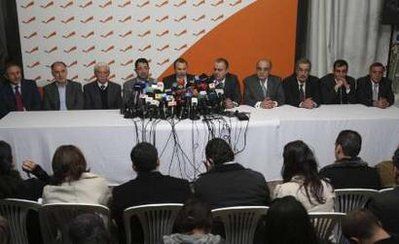
From left, Lebanese Ministers Ali Abdallah, Mohammed Fneish, Abraham Dedeyan, Hussein Hajj Hassan, Jibran Bassil, Mohammed Jawad Khalife, Fady Abboud, Charbel Nahhas, Youssef Saade and Ali Shami hold a press conference to announce their resignation in the northern Beirut suburb of Rabieh, Lebanon, Wednesday, Jan. 12, 2011. Lebanon's government collapsed After this press conference a Minister from the coalition of President Suleiman minister Adnan Sayyed Hussein presented its resignation too which conclude 11 ministers resigning 1/3 of the government. Hence the government collapse
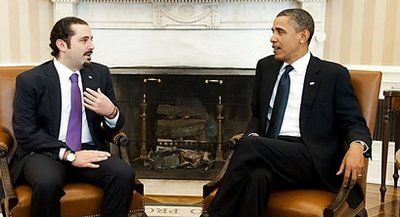
Lebanese Prime Minister Saad Hariri (L) meets with US President Barack Obama Wednesday at the moment that Hezbollah and its allies resigned from the Lebanese government, according to an AFP photographer. The two men were meeting in the Oval Office at the White House, smiling as they posed for photographers, without making any statements. (Nader Hariri was in company with PM Hariri
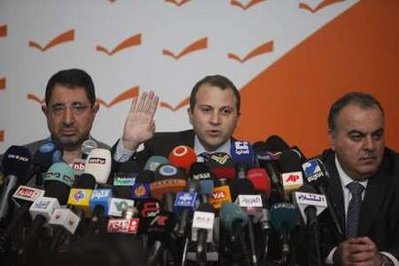
Lebanese opposition Ministers : Gebran Bassil (C), Lebanon's Minister of Energy and Water and allied to Hezbollah, announces a resignation statement as Mohammad Khalifeh (R), Minister of Health, and Hussein Haj Hassan, Minister of Agriculture, listen during a news conference in Rabieh, near Beirut, January 12, 2011. Lebanese minister Adnan Sayyed Hussein resigned on Wednesday, the state news agency said, bringing to 11 the number of ministerial resignations and effectively collapsing the government of Prime Minister Saad al-Hariri
A Lebanese official says Hezbollah ministers and FPM (Free Patriotic Movement) leaded by MP General Aoun and Marada Party leaded by Frangieh allies have resigned from the Cabinet, bringing the government to the brink of collapse.
Energy Minister Jibran Bassil told a news conference Wednesday that 10 ministers are pulling out. They need just one more minister to resign in order to force the government to fall and an 11th minister could resign later in the day.
The ministers are stepping down from the 30-member Cabinet over tensions stemming from a U.N.-backed tribunal investigating the assassination of a Former Prime Minister Rafik Harir
resignation of eleven ministers including a minister that represent President Michel Suleiman that reresent from the government's unity coalition Wednesday, which would topple the government and raise concerns of new protests and paralysis in Lebanon.
The Daily Star of Lebanon reports that the resignations, which were to be announced this afternoon local time, were due to Hezbollah and its allies being rabuffed in their demands for an emergency cabinet meeting Tuesday to discuss Lebanese cooperation in the United Nation's Special Tribunal for Lebanon (STL). The STL is investigating the 2005 assassination of Prime Minister Rafik Hariri, father of current Prime Minister Saad Hariri, who has refused to end Lebanese participation in the US-backed tribunal. Several Hezbollah members are expected to be indicted by the tribunal for involvement in the assassination.
WASHINGTON – President Barack Obama and Lebanese Prime Minister Saad Hariri on Wednesday reaffirmed their commitment to strengthening Lebanon's sovereignty and independence even as Hezbollah ministers forced the year-old unity government to collapse.
Hariri made no public comment after the Oval Office visit and immediately departed for France to consult with President Nicolas Sarkozy before returning to Beirut, according to a Lebanese official who spoke on condition of anonymity to discuss sensitive diplomatic moves
A White House statement issued after the meeting said Obama had commended Hariri for his "steadfast leadership and efforts to reach peace, stability and consensus in Lebanon under difficult circumstances."
A source told the Daily Star that Hezbollah and Free Patriotic movement sought the emergency cabinet meeting "to stop payment of Lebanon’s share toward the financing of the S.T.L., withdraw the Lebanese judges from the tribunal, end Lebanon’s cooperation with the S.T.L., and prosecute the 'false witnesses' linked to the U.N. probe into Rafik Hariri’s killing..." They warned that failure to hold the meeting would result in the mass resignations of its cabinet members, bringing down the government.
Khazen History


Historical Feature:
Churches and Monasteries of the Khazen family

St. Anthony of Padua Church in Ballouneh
Mar Abda Church in Bakaatit Kanaan
Saint Michael Church in Bkaatouta
Saint Therese Church in Qolayaat
Saint Simeon Stylites (مار سمعان العامودي) Church In Ajaltoun
Virgin Mary Church (سيدة المعونات) in Sheilé
Assumption of Mary Church in Ballouneh
1 - The sword of the Maronite Prince
2 - LES KHAZEN CONSULS DE FRANCE
3 - LES MARONITES & LES KHAZEN
4 - LES MAAN & LES KHAZEN
5 - ORIGINE DE LA FAMILLE
Population Movements to Keserwan - The Khazens and The Maans
ما جاء عن الثورة في المقاطعة الكسروانية
ثورة أهالي كسروان على المشايخ الخوازنة وأسبابها
Origins of the "Prince of Maronite" Title
Growing diversity: the Khazin sheiks and the clergy in the first decades of the 18th century
Historical Members:
Barbar Beik El Khazen [English]
Patriach Toubia Kaiss El Khazen(Biography & Life Part1 Part2) (Arabic)
Patriach Youssef Dargham El Khazen (Cont'd)
Cheikh Bishara Jafal El Khazen
Patriarch Youssef Raji El Khazen
The Martyrs Cheikh Philippe & Cheikh Farid El Khazen
Cheikh Nawfal El Khazen (Consul De France)
Cheikh Hossun El Khazen (Consul De France)
Cheikh Abou-Nawfal El Khazen (Consul De France)
Cheikh Francis Abee Nader & his son Yousef
Cheikh Abou-Kanso El Khazen (Consul De France)
Cheikh Abou Nader El Khazen
Cheikh Chafic El Khazen
Cheikh Keserwan El Khazen
Cheikh Serhal El Khazen [English]
Cheikh Rafiq El Khazen [English]
Cheikh Hanna El Khazen
Cheikha Arzi El Khazen
Marie El Khazen
